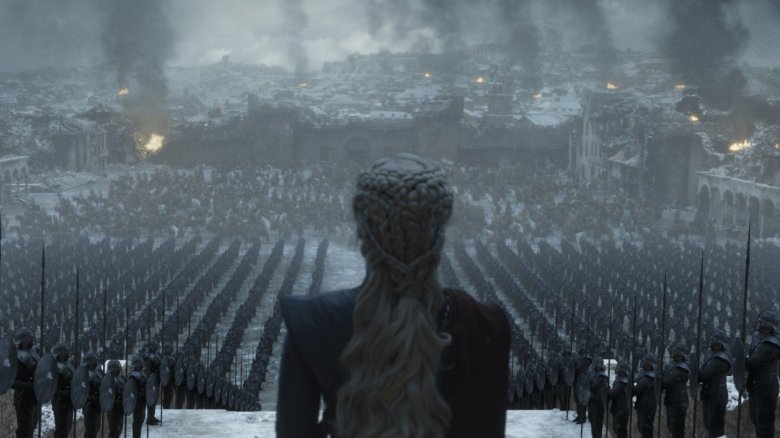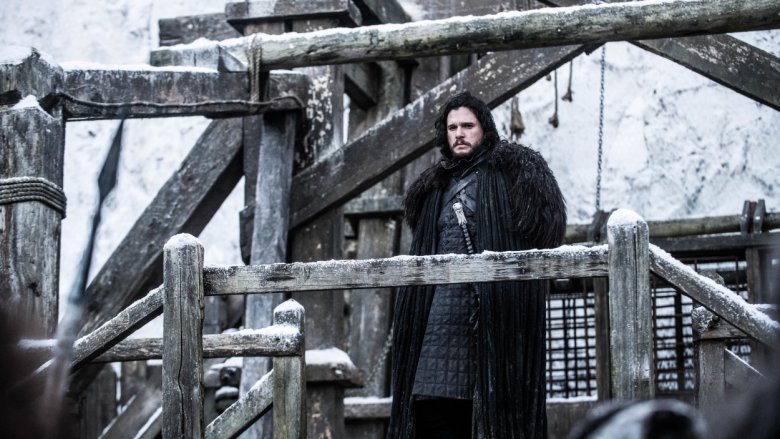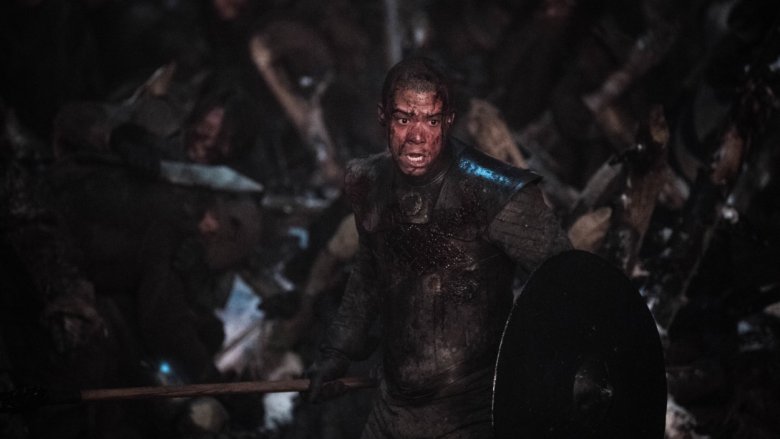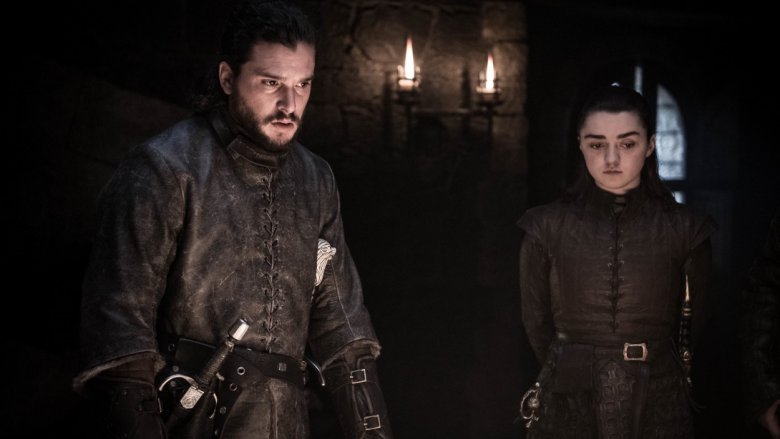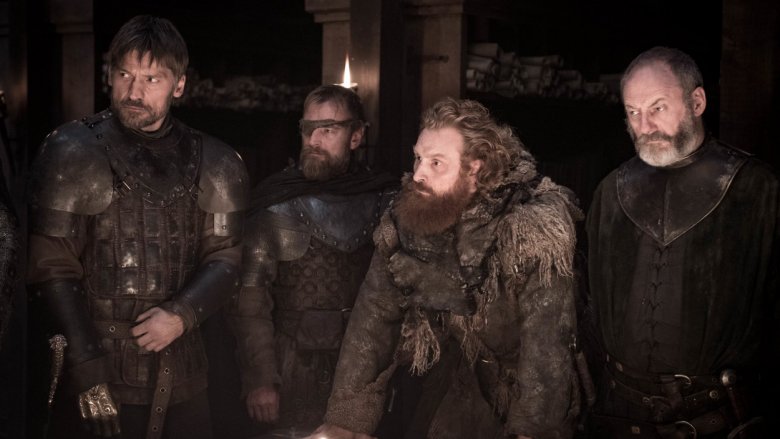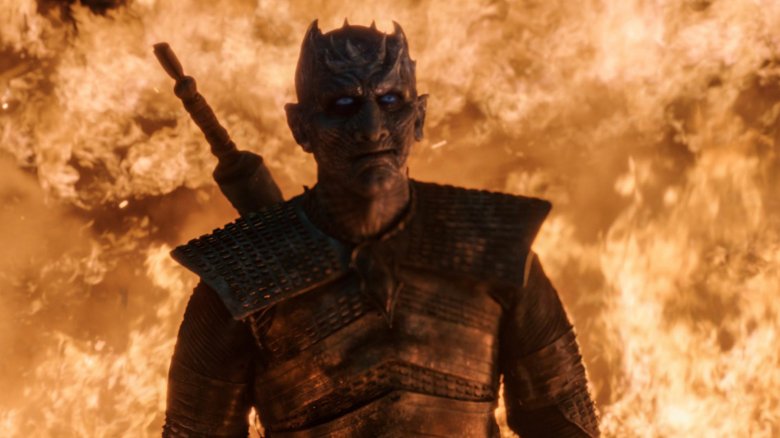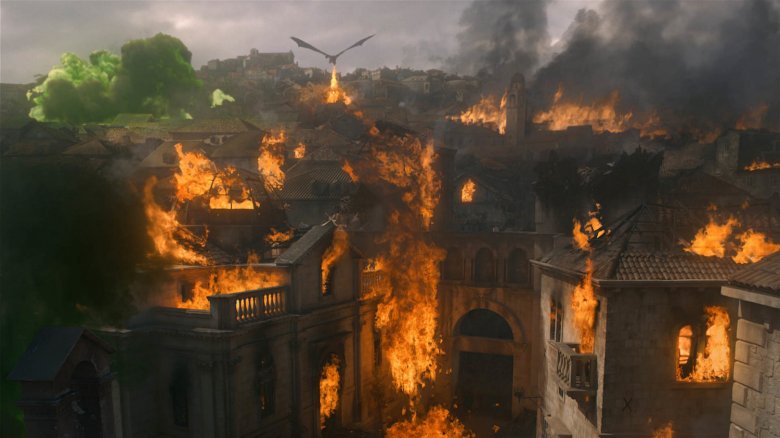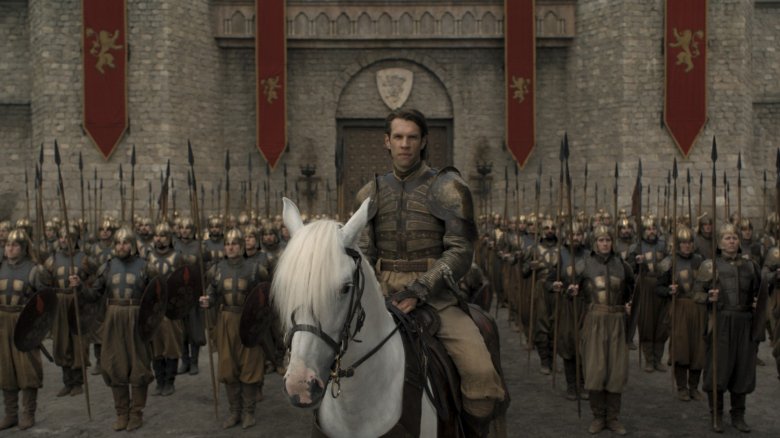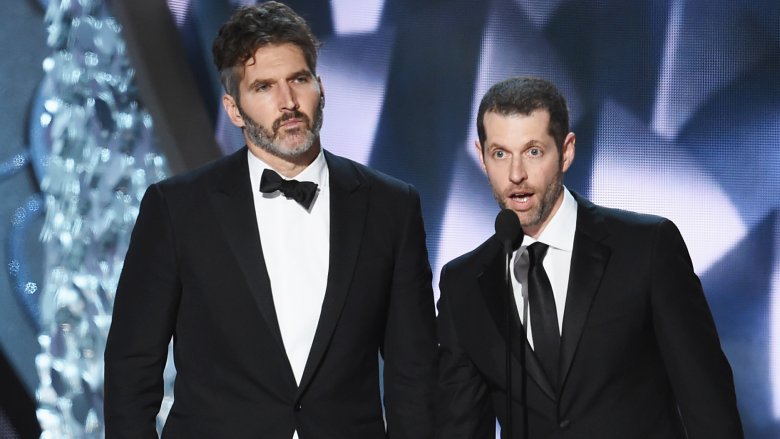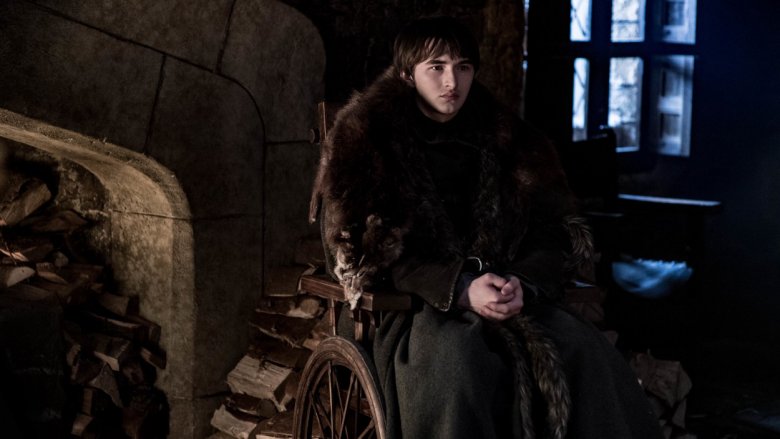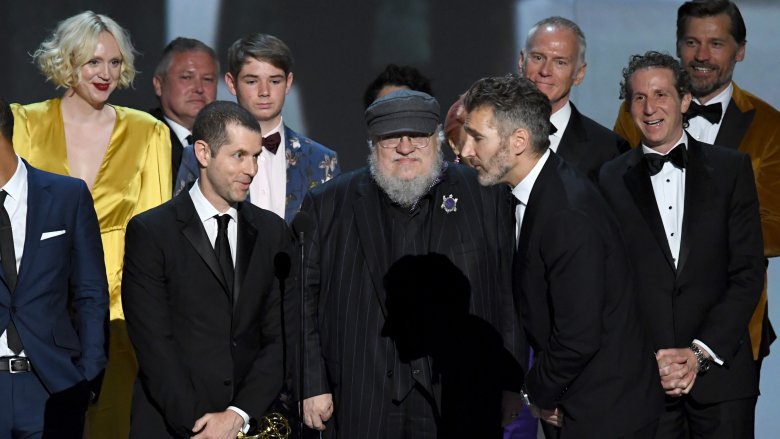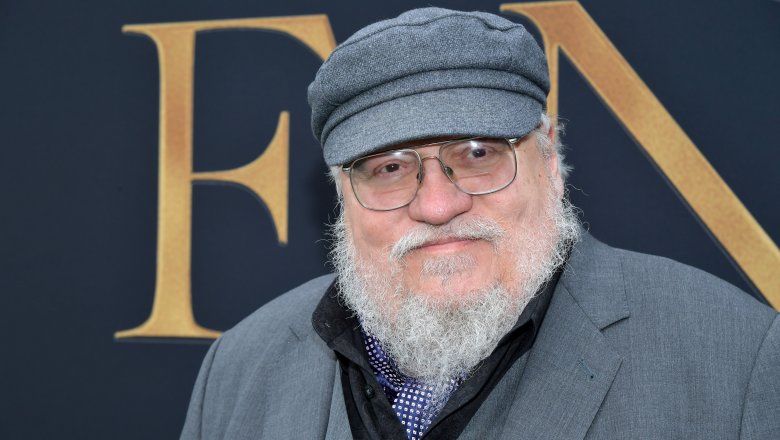Breaking Down Game Of Thrones' $90 Million Final Season Budget
The dust has settled, the bodies have been burned, and the fan reactions are in, bringing the final season of HBO's Game of Thrones to a decisive, albeit controversial, close.
Series creators Dan Weiss and David Benioff gave the world one of the most talked-about shows in history and ended it with a final run of episodes that many fans viewed as a decidedly mixed bag. Regardless of your opinions on how the story shook out, there's no denying that season 8 of the hit fantasy drama packed an awe-inspiring punch that very clearly cost HBO a pretty penny. According to multiple reports, the network shelled out roughly $15 million per episode to close out the final season. At roughly $90 million in total budget, season 8 marks both most expensive season of Game of Thrones — as well as the shortest, at only six episodes.
Whether you loved or hated the final season of Game of Thrones, it's clear that HBO spared no expense. What you may not know is where that money went, and how unique it is for a show to command this type of money.
Early days
It may be hard for some to remember when Game of Thrones was just an obscure series of fantasy novels — and a big risk for HBO.
Initially, the creators wrote and shot a pilot episode that was so abysmal they had to almost completely redo it to make what became the 2011 pilot episode. It's clear why HBO wasn't initially excited to drop millions of dollars on the world of Westeros — Benioff and Weiss revealed to Deadline that roughly 15 scenes in season 1 were thrown together on the cheap after they ran out of money with episodes clocking in well below HBO's usual runtime.
Fortunately, they put pen to paper and came up with some of their favorite scenes involving actors just talking. For example, a conversation between Robert Baratheon and Cersei Lannister became a favorite of theirs. Speaking to Vanity Fair about the execution of Ned Stark, director Alan Taylor could only notice the corners that were cut financially in the scene.
"It's funny seeing how small and rinky dink the scene is because Game of Thrones has gone on to become very well-funded by HBO," he said. "But at this stage in season one, no one had seen the show yet, we didn't know if it had an audience yet and we didn't have a dime."
More money, more battles
Fortunately, Game of Thrones' popularity quickly grew — and the network not only felt more comfortable giving the show money, but it practically had to in order to satisfy fans' growing demands. The first real money dump came in the penultimate episode of season 2, with the Battle of Blackwater. Even then, the creators had to fight for the cash.
"We had one really intense conference call with the HBO brass," Benioff told GQ in 2012. "It was awkward: They said, 'So, what are you guys talking about, an extra $500,000?' We said, 'Noooo....'"
Weiss continued: "I think we asked for $2.5 million. We got $2 million-something. That's a lot of money in TV. It was a big ask for them, and they understood it was really important. Our point was that the entire season was pointing toward this confrontation."
"Blackwater" reportedly set HBO back $8 million. As the story progressed, gone were the days of leaving things like dragons, white walkers and direwolves in the inexpensive background. According to an April 2016 print edition of Entertainment Weekly, season 6 saw the average episode budget increase from roughly $4 million to $6 million, allowing things like the famous Battle of the Bastards to take place. By the time all eyes were on HBO to show fans who would win the Game of Thrones, Weiss and Benioff could no longer work with anything but an unprecedented $15 million per episode.
Wait for it...
Following the season 6 finale, Benioff and Weiss revealed to Deadline that they had only ever mapped out the story for about 73 hours of television — meaning that season 8 would be its last, and shortest. However, what no one was expecting was to have to wait the better part of two years to see how things finally shook out.
Season 7 of Game of Thrones took its bow in August of 2017, and the show didn't return until April 2019. Logistically, the show is one of the largest undertakings in history. Even before the massive $90 million estimated budget for season 8, Thrones was television's all-time most expensive show to produce. It filmed in multiple locations in multiple climates with a massive cast and usually had to do so on a tight deadline. The creators opted to take their time, which only put more pressure on them and HBO to deliver something epic — and expensive.
A long wait for a short order
After the long wait, fans were understandably upset to learn that season 8 would only be six episodes. More than two years of pent-up demand is a lot, and it's not surprising that viewers expected a standard ten-episode season, even if season 7 bowed out after just eight. However, just a few weeks prior to the premiere, HBO soothed fans' indignant cries when it released the runtime for all six installments.
While episodes one and two clocked in at a standard 54 and 58 minutes respectively, the network also ended up gifting fans with four episodes that were roughly the length of a feature film at 1:22, 1:18, 1:20 and another 1:20. Even if fans might have preferred a heftier episode count, it started to become apparent that the series was dumping its money into large, decisive battles and CGI-heavy action sequences meant to dazzle the eager hordes of viewers.
The Long Night
With fans' two-year wait about to be over, all eyes pointed to the inevitable Battle of Winterfell. Not only would it wrap up the White Walkers and the Night King's storyline, it would likely eat up a good chunk of the $90 million budget. Entertainment Weekly's James Hibberd got to travel to Belfast to investigate the scope of the battle, and it was clear that HBO was investing heavily in the wrap up to this storyline.
"What we have asked the production team and crew to do this year truly has never been done in television or in a movie," said co-executive producer Bryan Cogman. "This final face-off between the Army of the Dead and the army of the living is completely unprecedented and relentless and a mixture of genres even within the battle. There are sequences built within sequences built within sequences."
For a show that delivered such gems as the Battles of Hardhome, Castle Black, and the Bastards, there was a lot of pressure to get this one right, which meant a big price tag. The battle included Jon Snow's direwolf in action, an aerial dogfight between three dragons, countless hordes of zombified soldiers, a giant, and much more. Sure, a few extra dollars could have been spent to brighten up the joint, but the battle ended up being the centerpiece of one of the show's more impressive — and expensive — episodes.
The Last War
While a large chunk of the Thrones budget likely went toward filming "The Long Night," it was hardly the only expensive part of season 8. In addition to paying a bevy of key cast members to die on camera, subsequent episodes featured the death of a dragon at the hands of Euron Greyjoy's expensive-looking fleet as well as a massive battle at King's Landing that saw another CGI dragon roast countless soldiers, buildings, ballistas and commoners alike. When it was all said and done, some of the most recognizable sets like the Iron Throne Room had to be redone to show the fallout from Daenerys Targaryen's now-infamous attack that reduced the city to ash.
In total, it's unclear where exactly all the money for season 8 went, but none of what was presented on screen comes cheap. According to Vanity Fair, the average pre-season 8 episode of Game of Thrones cost around $10 million. However, that was before every episode seemed to feature a high-stakes dragon fight.
Paying for fans' expectations
Season 1 of Game of Thrones forced the writers to orchestrate cost-effective scenes to tell its story. However, that was before the series became the network's biggest breakout hit of the past decade. Many would credit Thrones with ushering in a new age of cinematic, serialized "peak TV." Unfortunately, that created a blessing and a curse for the show, which not only had to keep topping itself but every other binge-worthy show that's come out since 2011.
Things needed to end on an epic note — as evidenced by the long-awaited Cleganebowl set piece, which saw two of the series' (literal) biggest characters battle it out on a crumbling staircase with a fire-breathing dragon circling above them. After years of buildup, reducing that showdown to accommodate a budget would have felt, well, cheap. We may never get a perfect idea of how Thrones spent every dollar of the estimated $90 million that went into season 8, but it's clear that behind the scenes, everyone involved understood that the cost was necessary to deliver what fans demanded.
Outspending the competition
While $15 million is certainly an impressive per-episode total for any series, shows like Band of Brothers and E.R. have come close to spending the same at their respective peaks. In 2019, Mental Floss notes The Big Bang Theory cost CBS roughly $9 million per episode after the cast's renegotiated paydays.
However, when it comes to shows that drop coin in the same way as Thrones, a number have come and gone since 2011 after spending a ton of money per episode, including Sense8 ($9 million), Marco Polo ($9 million), and The Get Down ($11 million). Meanwhile, Digital Spy reports Netflix's Altered Carbon set the streaming service back an estimated $7 million per episode, and The Crown reportedly costs $13 million each. While the minds behind the show would likely balk at the idea that the $90 million budget was for anything but servicing George R.R. Martin's story, it certainly doesn't hurt to be able to look down on your competition from atop a giant CGI dragon as it burns through a large pile of money.
However, what all these shows lack is the same audience engagement that Thrones commanded before it took its finale. The show appealed to a diverse audience and sent the world into a frenzy of speculation for years. Thrones was high on Insider's list of the most talked-about shows based on user engagement, and CinemaBlend cited a 2017 report naming Thrones one of the most tweeted-about shows during season 7.
Was it worth it?
With $90 million spent on ending one of the most epic and popular series in TV history, the obvious question is whether or not it was worth the coin.
More people than ever watched the final season of Game of Thrones, especially if you're British, so it's likely HBO will be getting a nice return on its investment. However, by and large, fans' reception of the show's final season skewed noticeably negative compared to its predecessors. After the series' penultimate episode saw Daenerys Targaryen turn genocidal seemingly on a dime, people were pretty off-board for whatever the finale planned to present. A petition urging HBO to remake the final season with writers that aren't "incompetent" gained more than 1.6 million signatures.
After the finale saw Daenerys die at the hands of Jon Snow (who was returned to the Wall for his trouble) and granted Bran Stark the Iron Throne, critics were as unkind as fans.
No show that scales the heights achieved by Game of Thrones will ever be able to please everyone with its finale, but all things considered — especially that incredible financial investment — HBO has to see the response to the final season as something of a disappointment.
Was it an investment?
Regardless of what fans thought about the final season of Game of Thrones, the money has been spent and the story is now canon. And with the series such a popular and lucrative hit for HBO, it's understandable that it's seeking to expand the franchise; to that end, the network has announced it's tapped talent to develop five potential spinoffs all set in different time periods of George R.R. Martin's world.
Max Borenstein (Kong: Skull Island), Jane Goldman (Kingsman: The Secret Service), Brian Helgeland (A Knight's Tale), Thrones writer Bryan Cogman, and Carly Wray (Mad Men) were all revealed to be developing spinoffs. Of those five, HBO has only confirmed that one has been given a pilot order thus far.
The spinoff is expected to take place thousands of years before the events of Game of Thrones and cover how things went from the Golden Age of Heroes to the White Walkers' origins in the first Long Night. Although Naomi Watts has been cast for a leading role, the series is still too early in development to know too much about the budget. However, after the massive paycheck it shelled out for season 8, HBO could be in a bit of a pickle.
Will it happen again?
Speaking to Deadline, HBO drama chief Francesca Orsi acknowledged that future shows can't have the same budget. "There is a conundrum if we do take off on one of these Game of Thrones spinoffs, where do we start? We can't obviously start with the budget of season 8, but would it be a Game of Thrones season three budget?"
HBO President Casey Bloys echoed those sentiments, adding, "As a show goes on they get more expensive and as shows get more ambitious they will get more expensive. More money doesn't always equal better but in some cases the scope of ideas do require it."
As a result, the question becomes how ambitious the planned prequel series will be. Based on the plot description, the prequel may be forced to deal more heavily with the magical elements that the flagship series largely avoided, which likely means a bigger budget. However, there are other logistical concerns: In May 2019, author George R.R. wrote that multiple Thrones-inspired series were still in active development, meaning multiple budget dilemmas for HBO.
